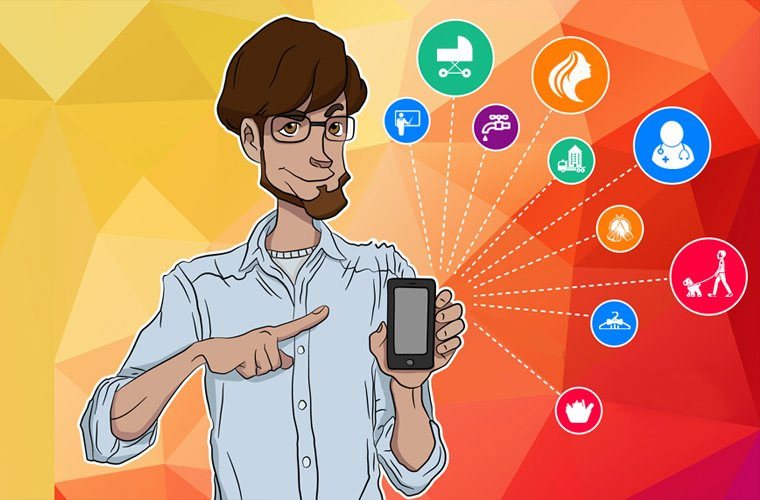Amongst the most popular trends of today’s business practices is the idea of a “shared economy”. As more and more people are coming to terms with how everyone can grow together, “facilitators” are becoming a subject of extreme demand. Businesses such as Uber, Lyft, Airbnb and so many other startups are a shining example of the Uber for X model.
This is a place where the buyer and seller get an opportunity to interact and then make an informed decision about whether they want to buy or sell at the given price. Essentially you can look at the model of Uber for X is a common ground where the buyer and seller can meet up. It is a digital coffee place. People meet in the virtual world; they interact about the works and finalize or cancel deals. This is Uber for X.
Uber for X is designed to fill any services to make on demand clone app. Uber for x is the most customizable app through which any individual can start their own business. If anyone already has a business like a taxi, car repairing, washing, dog walking or any other service providing business. He/she can consider purchasing Uber for X as it can make their business run digitally.
What is this Phenomenon Realistically?
If you are an aspiring entrepreneur who wishes to kick off a start up, then this should be especially interesting for you. A “shared economy” concept reduces the chances of risks and increases the chances of undertaking losses. But just like any business, you have to understand that there will always be an iota of risk.
How unlimited is the scope of unlimited possibilities with Uber for X?
Once impetus started growing for Uber and AirBnB, it was likely that other businesses imitated the model. It does offer many rewards to both service providers and for the end user as well. It is also a very convenient way to earn money because being digital, it is accessible to the masses.
Companies may need to spend considerable time and energies into preparing a stylish app, but the biggest advantage is that the app owner will not be required to DIRECTLY know the skills that are involved. So, for example, if a company owns an Uber for Carpenters kind of an application, no one in the firm needs to know carpentry. They will be responsible for providing a simple stage for independent carpenters to offer their services to anyone who is willing to hire them.
If we were to believe the industry experts, the scope of Uber for X is truly infinite. No matter what the service is if someone wants to hire the professionals they can do it using an app. There are already many different kinds of shared economy apps known as on demand applications. These include:
- Grocery Delivery
- Ordering Food,
- Getting Spa Services,
- Dog Walking
- Electrician
- Plumber
- Tutor
- Doctor
- Veterinarian
- House Cleaner
- Cook
And so on and so forth.
Likely Challenges
There are many advantages to this system of business but there are a few challenges as well.
Return on Investment
Every business wants to make money. That is the default definition of a business. Now, the probability of profitability is a gamble when it comes to such apps. This is because although you have the perfect and flawless app in your hands, you are probably not prepared in the true sense of the market.
This means, just buying an Uber for X kind of an application isn’t a certificate of surety for you. It is, in fact, a cheque that you can only encash if you go to the right market. If the market is ready, you are sure to succeed. But if your users and service providers aren’t ready to handle that kind of a business model, you probably won’t be able to succeed.
Competition in the market
The market is going crazy about on demand apps. There are too many companies out there who are trying to get a piece of the pie. This is why it is probably wise to enter the market before anyone else does. If you start a service and are able to amass a loyal user base, they will not shift on to any new player who enters the market.
The Future of the Sharing Economy
It seems foreseeable that the sharing economy will maintain its growth regardless of facing some real hurdles. It’s simply too dominant and well-organized to fade away. This has weighty propositions for the outlook of the economy. People have come to imagine that they can rapidly access just about any type of service by tapping on their smartphones. So, this is the best business to step into right now.
Well, it’s not a new thing, sharing is basically a human nature. This human nature is been involving around since the beginning of time. But what’s new in sharing? Why has collaboration become a part of the economy? Nowadays, the technology has changed our way of living. Today, people are using various platforms that enable them to share information rapidly. Devices like smartphones, tablets, and laptops are finest examples of future transition. Payment methods are getting more convenient, there are online payment gateways from where one can easily pay for their purchased product. Now debit or credit cards are not only usable on ATM machines, they can be used online for transferring money from any location all around the world.
The world has changed with the help of this technology. The incorporation of all these factors has made sharing more scalable. If you take a look 15-20 years before, the scenario was on the different scale but with the help of social media, people were started getting aware of the technology. The technology that has now made our day to day lives very easy. And that how sharing economy has got it a turning point.
